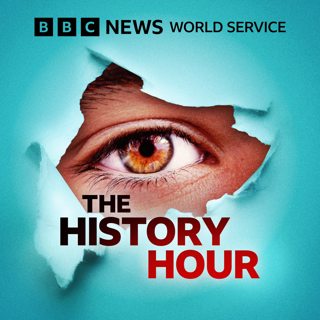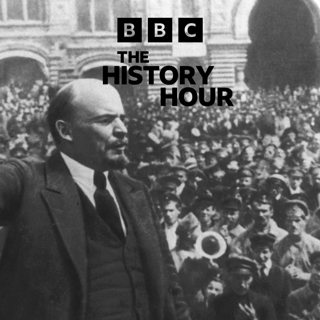
The Chindits and USAID
Max Pearson presents a collection of this week's episodes of Witness History.The formation of an unconventional special force during the Second World War sparks a discussion about three others around the world with military historian Lucy Betteridge-Dyson.Plus, the founding of the United States Agency for International Development, the discovery of the wreck of the Titanic 40 years ago and the first baby born after a womb transplant. Finally, Mexican-American boxer Oscar De La Hoya's toughest test - a clash with Ghana's Ike 'Bazooka' Quartey and how the online marketplace started at a house party in Lithuania in the noughties.The first item contains outdated and offensive language.Contributors: Major General Orde Wingate - leader of the Chindits. Baroness Jackson - economist who influenced the founding of USAID. Cathy Offinger and Jean Louis Michel - explorers who helped find the wreck of the Titanic. Prof Pernilla Dahm-Kähler - gynaecologist who helped deliver the first baby after a womb transplant. Oscar De La Hoya - boxer nicknamed 'the Golden Boy of Boxing'. Milda Mitkutė - co-founder of Vinted.This programme has been updated since the original broadcast to add additional context.(Photo: Members of the Chindits in the jungle in Burma, now Myanmar. Credit: Hulton Archive / Getty Images)
6 Syys 1h

Washington DC and a film noir classic
Max Pearson presents a collection of the week's Witness History interviews from the BBC World Service.We learn why the Mount Pleasant riots erupted in Washington DC in 1991, and hear from our guest, Sarah Jane Shoenfeld, a public historian of the US capital. Plus, more on John Lennon’s benefit concerts at Madison Square Garden in New York, his final and only full-length solo shows after leaving The Beatles.And the story behind how the world's first permanent international criminal court was created in 1998. Also, when the internet security tool, Captcha, moved from an idea to a reality, and why a photo of Chile’s goalkeeper in 1989 exposed a cheating scandal. Finally, a peak behind the scenes of the making of a noir film classic, The Third Man. Contributors:Victor ‘Lilo’ Gonzalez – Mount Pleasant resident. Sarah Jane Shoenfeld - public historian. Andrei Broder – computer scientist. Judge Phillipe Kirsch – chair of the Rome conference. Geraldo Rivera – TV journalist. Ricardo Alfieri – sports photographer. Angela Allen - production assistant.(Photo: Capitol Building, Washington DC. Credit: Getty Images)
29 Elo 1h

BlackBerry phones and Spot the dog
Max Pearson presents a collection of the week's Witness History interviews from the BBC World Service. Our guest is Jacquie McNish, author and former Senior Correspondent at the Wall Street Journal.We start with the former co-CEO of BlackBerry, who recounts the company's remarkable boom and bust.Then, the creation of the Spot the dog children's books in the 1970s. We hear the testimony of a US soldier who defected to the Soviet Bloc in the 1950s.An author recalls how her 2010 book challenged Norway's immigration policy.The inside story of the creation of the Women's Rugby World Cup in 1991.Finally, the 19th century battle that inspired the Geneva Conventions.Contributors:Jim Balsillie - former BlackBerry co-CEO. Jacquie McNish - Author and former Senior Correspondent at the Wall Street Journal. Chris Hill - son of Eric Hill, creator of Spot the dog. Victor Grossman - US soldier who defected to the Soviet Bloc. Maria Amelie - author of book on Norway's immigration system. Alice D Cooper - organiser of the first Women's Rugby World Cup. Henry Dunant - instigator of the Geneva Conventions, diary read by his descendant Gabriel Martinez.(Photo: Jim Balsillie, former co-CEO of BlackBerry. Credit: Visual China Group via Getty Images)
23 Elo 59min

Indonesian history
Max Pearson presents a collection of the week’s Witness History interviews from the BBC World Service.Our guest is Dr Anne-Lot Hoek, a research fellow at the International Institution of Social History in Amsterdam.This week, we’re looking at key moments in Indonesian history, as the country marks 80 years since independence. We start by hearing about the writer Pramoedya Ananta Toer, who wrote Buru Quartet while imprisoned in the notorious labour camp on Buru island.Then, the reopening of the worlds’ largest Buddhist monument after major restoration work.Plus, 50 years since the Santa Cruz massacre, when Indonesian troops opened fire on independence activists.Also, Jakarta’s ban on the use of dancing monkeys on the city’s streets. And, the discovery of a new species of human.Contributors: Pramoedya Ananta Toer - archive recordings of the writer.Werdi – one of the workers on the project.Dr Anne-Lot Hoek - research fellow at the International Institution of Social History in Amsterdam.Max Stahl - archive recordings of the British cameraman.Femke den Haas – animal rights activist.Peter Brown - Australian paleoanthropologist.(Photo: Pramoedya Ananta Toer. Credit: Reuters)
15 Elo 50min

Nagasaki bomb and Brazil’s biggest bank heist
Max Pearson presents a collection of the week’s Witness History interviews from the BBC World Service. Our guest is Simone Turchetti, Professor of the History of Science and Technology, at The University of Manchester in the UK. It's 80 years since the US dropped atomic bombs on Hiroshima and Nagasaki, forcing Japan to surrender at the end of the Second World War. We hear from a British prisoner of war who was in Nagasaki at the time.Then, the son of musician Dmitri Shostakovich tells of his famous father’s confrontation with Stalin in the 1930s. Also, the story of a man who survived an 8.6 magnitude earthquake that shook the Himalayan mountains in 1950.Plus, Singapore's tense and tearful 1965 separation from the Federation of Malaysia and the detective who tracked down the gang responsible for Brazil's biggest bank heist.Contributors: Simone Turchetti - Professor of the History of Science and Technology, at The University of Manchester. Maxim Shostakovich – son of musician Dmitri Shostakovich Manjeet Kaur- remembering Singapore independence in 1965. Antonio Celso Dos Santos – detective in Brazil Plus, archive recording of Geoff Sherring, a British prisoner of war in Nagasaki and Frank Kingdon-Ward who survived an earthquake that shook the Himalayan mountains in 1950.(Photo: Nuclear explosion over Nagasaki. Credit: Pictures from History/Universal Images Group via Getty Images)
9 Elo 50min

Russian revolutionaries and Japan’s record breaking rollercoaster
Max Pearson presents a collection of this week’s Witness History episodes from the BBC World Service.Our guest is Dr Lara Douds, Assistant Professor of Russian history.We start in 1907, the men who would go on to lead the Russian Revolution met in London for a crucial congress marking a point of no return between the Bolsheviks and the Mensheviks. Then, in 2000, the launch of Steel Dragon 2000 at Nagashima Spa Land in Japan, becoming the world’s longest rollercoaster at nearly 2.5 km in length.Next, the political assisination of Juan Mari Jauregui, a retired Spanish politician and long-time campaigner for independence, by Basque separatists in 2000.Plus, how in 1986, during a world record attempt and publicity stunt, one and a half million balloons were released as a storm rolled over the city.Finally, the story of Chuquicamata, Chile’s abandoned mining town after its 25,000 residents left due to pollution concerns .Contributors: Henry Brailsford - British journalist Dr Lara Douds - Assistant Professor of Russian history Steve Okamoto - rollercoaster designer Maixabel Lasa - widow of Juan Mari Jauregui Tom Holowatch - project manager of BalloonFest '86 Patricia Rojas - former resident of Chuquicamata(Photo: Lenin giving a speech in Red Square. Credit: Universal History Archive/Getty Images)
1 Elo 50min

Saxophone diplomacy and bulletproof vests
Max Pearson presents a collection of the week’s Witness History interviews from the BBC World Service. Our guest is Dr Natalia Grincheva, an expert in cultural diplomacy from Lasalle, University of the Arts in Singapore. We start by hearing about when US president Bill Clinton was presented with a saxophone on a 1994 visit to Prague and he and the Czech president Vaclav Havel performed together on stage.Then, India’s first female anthropologist, Irawati Karve.Twenty years on, the cousin of John Charles de Menezes, describes the day the unarmed Brazilian man was shot dead by anti-terrorism police in London.Plus, the discovery of the super-strong fibre Kevlar in 1965 which was used in bulletproof vests.And finally, 50 years on from the premiere of the Broadway hit A Chorus Line, an original cast member shares her memories.Contributors:Urmilla Deshpande – granddaughter of Irawati Karve.Patricia da Silva – cousin of Jean Charles de Menezes.Baayork Lee – Connie in A Chorus LinePlus, archive recording of Stephanie Kwolek, and material from the Vaclav Havel Center and the William J Clinton Presidential Library.(Photo: President Bill Clinton accepts a saxophone as a gift from a Belgian delegation in 1994. Credit: Luke Frazza/AFP via Getty Images)
25 Heinä 50min

Nuclear diplomacy and Italo disco
Max Pearson presents a collection of the week's Witness History interviews from the BBC World Service. Our guest is Dina Esfandiary, Middle East Geo-economics Lead at Bloomberg Economics.We start in 2015 with insider accounts of the Iran nuclear deal and the Greek debt crisis.Then, the 1995 'Turbot War' between Canada and Spain.We hear how international broadcaster Voice of America was born during World War 2. Finally, the rise of Italo disco in the early 1980s.Contributors:Baroness Catherine Ashton - EU High Representative for Foreign Affairs and Security Policy. Dina Esfandiary - Middle East Geo-economics Lead at Bloomberg Economics. Euclid Tsakalotos - Greece's Finance Minister. Brian Tobin - Canada’s Minister for Fisheries and Oceans. Ryan Paris - singer of Dolce Vita.(Photo: Iran's Foreign Minister Mohammad Javad Zarif and US Secretary of State John Kerry in 2015. Credit: Thomas Imo/Photothek via Getty Images)
19 Heinä 51min






















